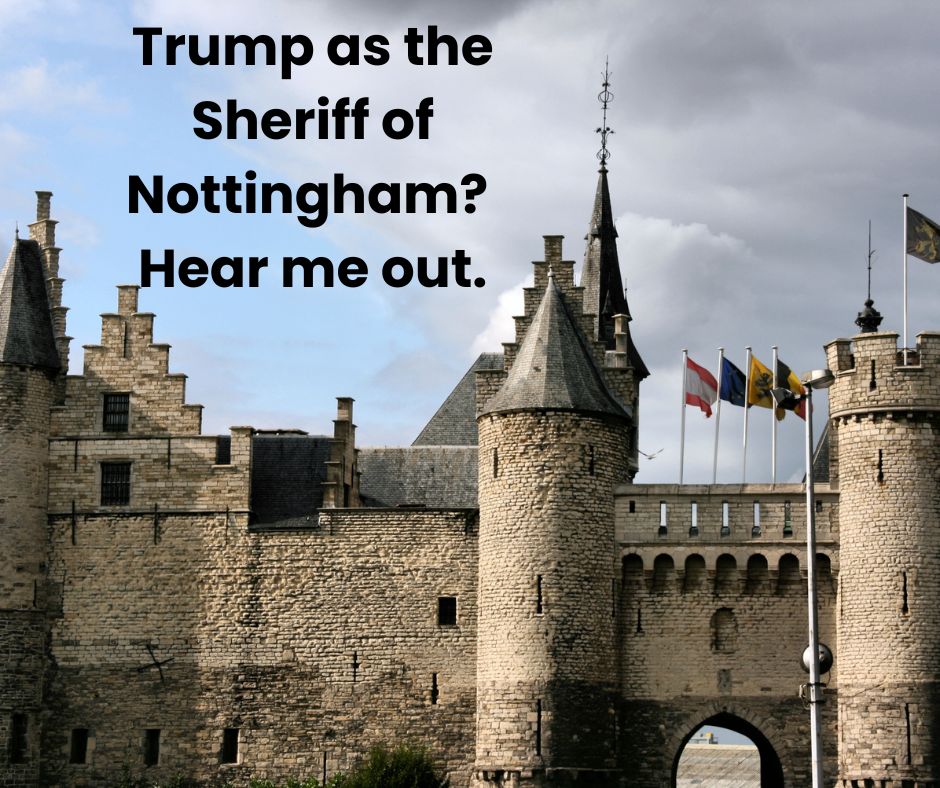Trump, Tariffs, and Tech Billionaires: America’s Modern-Day Sheriff of Nottingham

Trump’s use of tariffs, particularly his America First economic policies, can be likened to an old English king using taxation and land control to consolidate power and wealth.
In medieval England, kings (or their enforcers like the Sheriff of Nottingham) would impose taxes, seize land, or demand tributes from nobles and peasants. These funds would be used to strengthen the crown’s position, fund wars, or reward loyal allies. Similarly, Trump’s tariffs act as a kind of economic toll, where foreign goods entering the U.S. are taxed, theoretically making domestic goods more competitive. But like the old feudal tax system, the burden often falls on the people—in this case, American consumers and businesses that end up paying higher prices.
The Sheriff of Nottingham was notorious for collecting excessive taxes from the poor to enrich Prince John. While Trump’s tariffs are pitched to punish foreign competitors (especially China), they often end up functioning as a tax on American businesses and consumers, much like how medieval tax policies hurt commoners more than the nobility.
Of course, the key difference is that tariffs are an official trade policy tool meant to protect domestic industries, whereas medieval land seizures and tax collections were often pure power grabs. But in both cases, the leader is using economic force to consolidate control—whether over land or trade.
What do you think? Do you see Trump’s tariffs as a strategic move or more of a modern-day feudal tax scheme?
Trump’s tariffs can also be compared to the McKinley Tariff (1890) and later the Smoot-Hawley Tariff (1930), which contributed to the Great Depression. If we extend the medieval analogy, McKinley’s protectionist policies—and later Smoot-Hawley—acted like a king raising tolls on foreign merchants, thinking it would enrich his own kingdom, but instead, it caused economic retaliation and collapse.
McKinley Tariff & Smoot-Hawley: The Medieval Tax Trap
The McKinley Tariff, much like Trump's tariffs, was designed to protect American industries by raising duties on imported goods. It initially boosted some sectors but led to price hikes for consumers. It also made foreign nations retaliate by putting their own tariffs on U.S. exports, hurting American farmers—much like how a medieval king raising tolls on trade routes could cause foreign merchants to avoid his lands, shrinking his economy.
This set the stage for the Smoot-Hawley Tariff (1930), which was essentially an economic fortress wall built during the Great Depression. Instead of helping, it worsened the crisis by strangling global trade, much like a feudal kingdom isolating itself through heavy taxation, leading to starvation and decline. Other nations retaliated, global trade plummeted, and the depression deepened.
Trump’s Tariffs: Modern-Day Sheriff of Nottingham?
Trump’s trade war with China and other nations echoes these past mistakes. While pitched to strengthen American industry, the tariffs acted as a tax on U.S. businesses that relied on global supply chains. The burden fell on consumers, just as medieval peasants bore the weight of excessive taxation. Additionally, China and the EU responded with their own tariffs, just as foreign kingdoms in medieval Europe would counter high taxes by blocking trade or raiding merchant caravans.
Much like the Sheriff of Nottingham enforcing Prince John's crushing taxes, Trump's tariffs took money from businesses and consumers under the promise of national strength but often hurt the very people they were supposed to protect.
Will History Repeat Itself?
The biggest question is whether Trump’s tariffs will lead to long-term economic damage like Smoot-Hawley did. So far, the U.S. economy has stayed strong, but if trade wars escalate, it could set off the same domino effect as the Great Depression.
Would you say Trump’s tariffs are more about economic nationalism, or do you think they risk repeating the mistakes of the past?
Who plays who in this scenario?
Trump as Prince John / The Sheriff of Nottingham
In the Robin Hood legend, Prince John and his enforcer, the Sheriff of Nottingham, tax the people into poverty under the guise of "law and order," while favouring the rich and powerful. Trump plays a similar role—using tariffs (which function like taxes) and economic policies that claim to help the common folk but often enrich the elite. Like the Sheriff, Trump positions himself as a "protector" of the nation but uses his power to benefit himself and his allies.
Billionaires as the Noble Class / Tax Collectors
In medieval times, the nobility worked together with the crown, helping enforce tax collection while receiving special privileges. Today’s billionaires play a similar role. They benefit from corporate taxes and deregulates industries, allowing them to amass even more wealth—just as medieval lords were granted land and tax exemptions by the king in exchange for loyalty.
Even though billionaires isn’t directly tied to tariffs, they benefit from Trump-era policies like tax cuts and deregulation, much like how medieval lords got richer while the peasants (everyday Americans) bore the brunt of economic hardship.
Who Are the Peasants?
The everyday workers, small businesses, and consumers are like the peasants in Nottingham—they pay the price for these policies. Just as medieval commoners had no say in the king’s taxation but suffered its effects, modern consumers and workers are forced to deal with rising prices from tariffs, job instability, and an ever-growing wealth gap.
So, Where’s Robin Hood?
If the Sheriff (Trump) and his noble allies (tech billionaires) are hoarding wealth, who’s the Robin Hood in this scenario? Some might argue it's progressive politicians like Bernie Sanders or Elizabeth Warren, pushing for wealth redistribution and regulations. Others might say it’s everyday Americans finding ways to push back—through unions, protests, or breaking into decentralised economies.